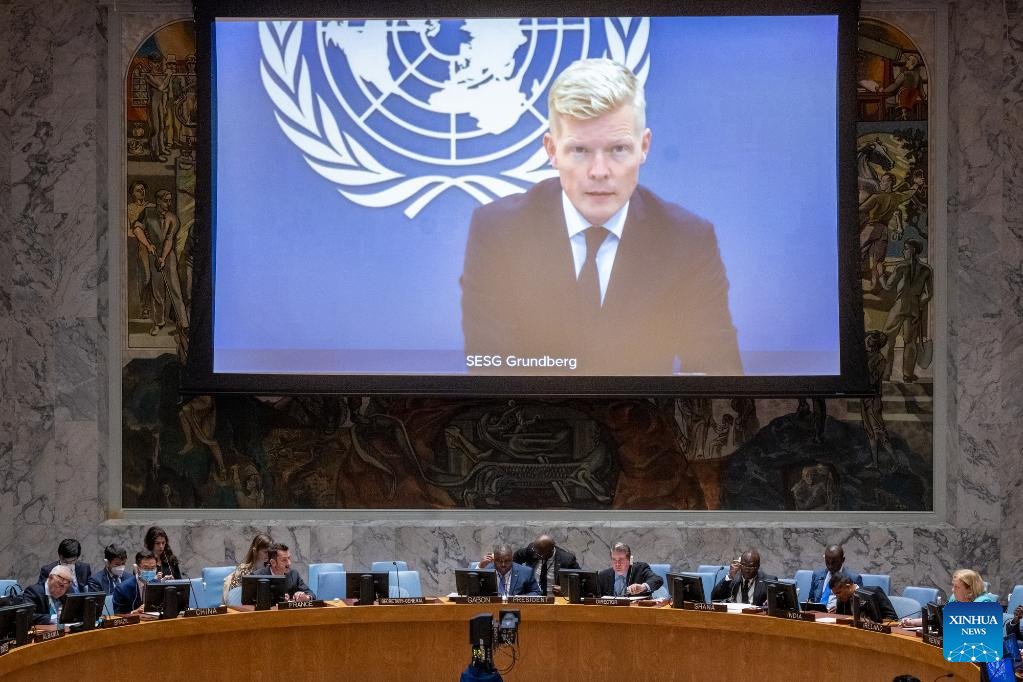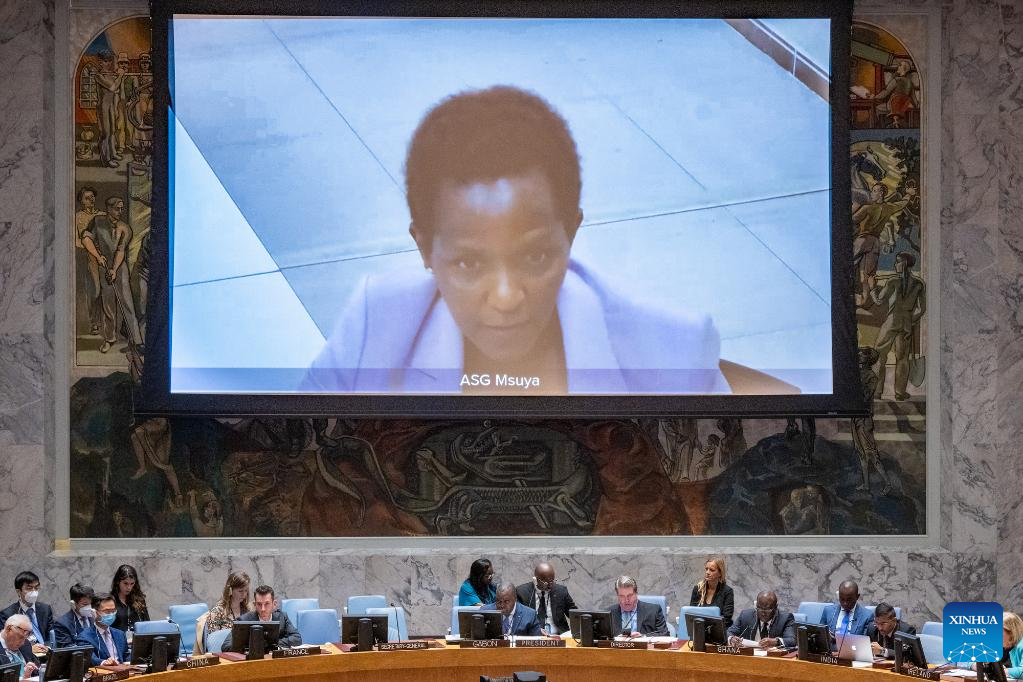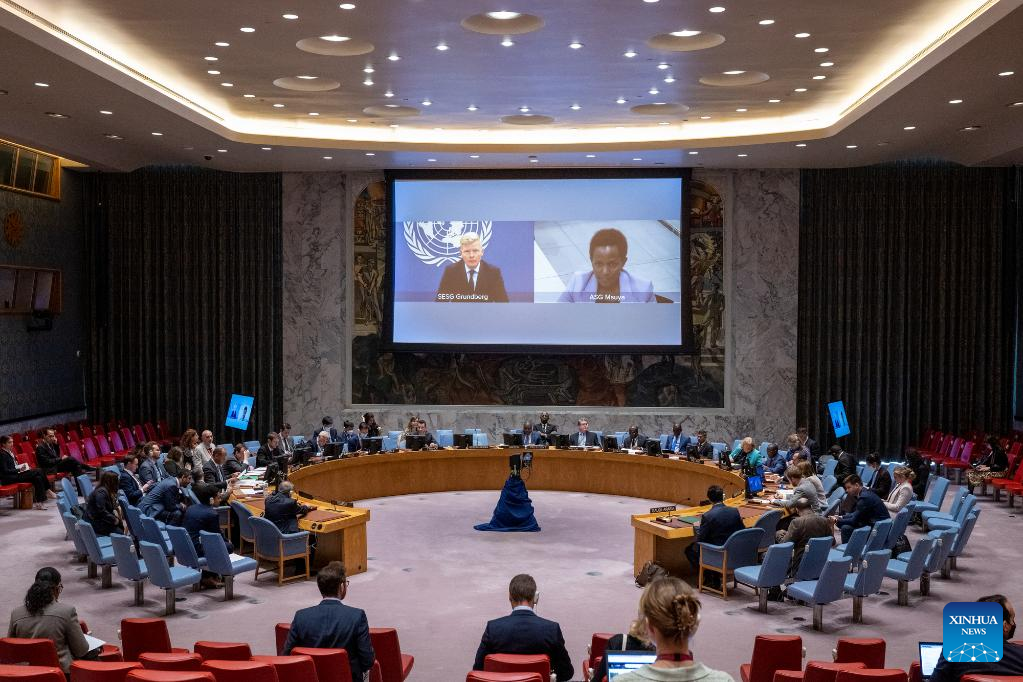Truce renewal in Yemen remains possible: UN envoy

UN Special Envoy for Yemen Hans Grundberg (on the screen) speaks via a video link at a Security Council meeting at the UN headquarters in New York, on Oct. 13, 2022. Grundberg said Thursday that the renewal of a truce agreement that has just expired remains possible and called for the engagement of the parties. (Eskinder Debebe/UN Photo/Handout via Xinhua)
UNITED NATIONS, Oct. 13 (Xinhua) -- UN Special Envoy for Yemen Hans Grundberg said Thursday that the renewal of a truce agreement that has just expired remains possible and called for the engagement of the parties.
The truce in Yemen, first enforced on April 2 and renewed twice till its expiration on Oct. 2, started to alleviate the suffering of Yemeni men and women and offered a truly historic opportunity to build trust and to work toward a peaceful settlement of the conflict, he told the Security Council in a briefing.
The failure of the parties to agree on the renewal of the truce has caused new uncertainty for the country and a heightened risk of war, he warned.
"The parties now have a choice before them. They can choose to preserve and build on the truce and take the path toward peace as is expected from them by the Yemeni population. Otherwise, a return to war would mean renewed and increasing suffering for the civilian population," said Grundberg. "The choice to go back to war would also have destabilizing effects for the whole region. And should the cycles of violence and escalation start, it could be long before a window for peace will open again. Yemen urgently needs to avoid this scenario."
Grundberg said he worked hard to try to save the truce.
Efforts to not only extend, but also to expand and build on the elements of the truce have been ongoing since early July. On Sept. 18, he shared a proposal for a six-month extension and the expansion of the truce elements with the parties. And in the weeks leading up to the Oct. 2 deadline, he intensified discussions. He subsequently shared a revised proposal on Oct. 1, said Grundberg.
"I appreciate the position of the government of Yemen on engaging positively with my proposal, and I regret that Ansar Allah came up with additional demands that could not be met," he said, using the official name of the rebel Houthi movement. "As I continue to work with both sides to find solutions, I urge them to demonstrate the leadership and flexibility required to reach an extended and expanded agreement."
Since the expiration of the truce, he continued efforts to engage the parties as well as regional and international partners on options for the renewal of the truce, said Grundberg.
"I have just returned from visits to Abu Dhabi and Muscat where I held important discussions to explore ways forward in close coordination with Yemen's neighbors. I personally believe that there is still a possibility for the parties to come to an agreement," he said.
Grundberg said his proposal addresses the key -- competing -- demands of both sides, in a balanced manner: the continued halt of all offensive operations and an enhanced Military Coordination Committee as a robust de-escalation communication and coordination channel, a transparent and effective disbursement mechanism for the regular payment of civil servant salaries and pensions, the phased opening of roads in Taiz and other governorates, an increase in the number of flights and destinations to and from Sanaa International Airport, the regular and unhindered flow of fuel to the ports of Hodeidah, a commitment to urgently release detainees.
Additionally, for long-term progress toward a settlement of the conflict, the proposal also includes the establishment of structures for the initiation of negotiations over economic issues, a durable cease-fire, and, most importantly, the resumption of a Yemeni-led, inclusive political process to work toward a comprehensive resolution of the conflict, he said.
"It is important to remember that the truce was never intended as an end in itself, but as a building block to enhance trust between the parties and establish a conducive environment to work toward a political solution to the conflict," said Grundberg.
He welcomed that the parties have shown restraint since the expiration of the truce.
Fortunately, there has not been any major military escalation, only sporadic exchanges of artillery and small-arms fire in front-line areas in Taiz, Marib, Hodeidah, and Dhale, he said. "I urge the parties to continue to exercise maximum restraint."
Since Oct. 2, flights between Sanaa airport and Amman, Jordan, have continued to operate. Similarly, fuel ships have continued to regularly enter the ports of Hodeidah governorate, he said. "I therefore call on the parties to uphold and safeguard the arrangements that operated under the truce, and which have brought vital benefits to the Yemeni people."
The achievement and benefits of the truce should not be underestimated. The truce came into effect after almost eight years of conflict and brought the longest period of calm yet, he said.
During the truce, there were no major military operations. Casualties dropped by 60 percent. The reopening of Sanaa airport with 56 commercial roundtrip flights to date has transported almost 27,000 passengers who sought medical attention, educational or business opportunities abroad. Over 1.4 million metric tons of fuel product was delivered to Hodeidah ports, more than three times the amount of fuel products entering in 2021. Face-to-face meetings of the parties under UN auspices on military de-escalation and road openings in Taiz and other governorates were held, he noted.
He called on the parties in Yemen to revive the truce.
"With the stakes this high, it is critical that we do not lose this opportunity. The parties need to demonstrate the leadership, compromise and flexibility required to urgently reach an agreement on the renewal and expansion of the truce," said Grundberg. "The members of this (Security) Council and the international community are following the situation in Yemen with concern. Yet, ultimately, the parties' duty is to the men and women of Yemen -- to find solutions that are in the best interests of the Yemeni population and to pursue every avenue for peace."

Joyce Msuya (on the screen), UN assistant secretary-general for humanitarian affairs and deputy emergency relief coordinator, speaks via a video link at a Security Council meeting on Yemen, at the UN headquarters in New York, on Oct. 13, 2022. The UN deputy emergency relief coordinator on Thursday called for more funds for humanitarian aid in Yemen. (Eskinder Debebe/UN Photo/Handout via Xinhua)

Joyce Msuya (R, on screens), UN assistant secretary-general for humanitarian affairs and deputy emergency relief coordinator, speaks via a video link at a Security Council meeting on Yemen, at the UN headquarters in New York, on Oct. 13, 2022. The UN deputy emergency relief coordinator on Thursday called for more funds for humanitarian aid in Yemen. (Eskinder Debebe/UN Photo/Handout via Xinhua)
Photos
Related Stories
Copyright © 2022 People's Daily Online. All Rights Reserved.









